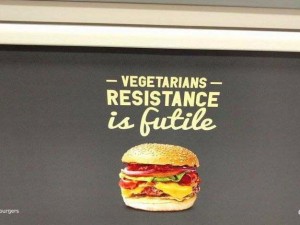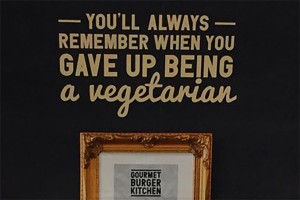‘Gourmet Burger Kitchen’s latest ad campaign just massively backfired’, reads the first line of this article.
But did it backfire?
If you haven’t seen GBK’s controversial campaign, here’s a couple of the ads:
There’s another one, showing an image of a cow, which reads; ‘They eat grass so you don’t have to’.
The campaign is seen to have ‘backfired’ and has been labelled ‘terrible marketing’, generating a large number of complaints, not least by vegans/vegetarians.
From what I can gather though, the ads only seem to have been up at a handful of train/tube stations, and within a few tube carriages. I wonder why… I wonder if this is ‘terrible marketing’…
Do you remember the controversy around the ‘Beach Body Ready‘ campaign, last summer? Remember all the hype and shouting across social media? Remember how insults were slung back and forth between Protein World (the company behind the ads) and those complaining? Remember how many times that ad circulated – free of charge – across Facebook, Twitter, Reddit, all daily newspapers, national news channels?
Prior to that, do you remember the Marmite ad – entirely humorous – that had people clamouring about ‘animal cruelty’ or ‘mocking animal cruelty’?
Do you think GBK’s marketing team have done a ‘terrible job’ or do you think they knew exactly what they were doing?
If you have a campaign idea, but you have a limited budget (or you just want to save money), why would you splash thousands (in the case of larger brands; millions) of pounds on paid-for media space – cross-track poster sites, outdoor billboards, press ads in major publications – when you could court controversy, wind up a group of people, and have your adverts shared thousands of times, for free, across; Twitter, Facebook, The Metro newspaper, The Independent, The Sun, ITV News, BBC News?
Because the reactions of people are all too obvious, it’s easy: poke a particular group (with particular beliefs) with a large stick, and watch the predictable response.
It’s this very reaction that keeps people like Katie Hopkins in the spotlight. She looks at a tragic incident, thinks ‘what’s the worst thing I can say about this that’s just about legal?’, punts her comment(s) out there, and watches people share and comment on it … even more so if they hate her.
It’s not that vegans don’t have a right to be annoyed by GBK’s ads, or that they don’t have a point; it’s that they’ve done exactly what GBK expected them to do, and what they wanted them to do. GBK have used the ire of vegans to boost their marketing.
Vegans will never be within GBK’s target audience – I imagine there’s nowhere a vegan would less like to visit – so what difference if GBK p*ss them off?
Not only that, but a number of people don’t just like eating meat – they revel in it; ‘I’m a proper bloke, I love eating juicy burgers and steaks’ etc.
These are the kind of people who would relish a campaign such as the one GBK have brought out: they may even like to poke fun at ‘veggies’. For them, the campaign is a nudge and a wink from GBK.
The irony is, it’s the outrage of vegans/vegetarians that has seen this campaign passed around, again and again, and has seen GBK’s name mentioned countless times on social media. Even the negative tweets will still have #GBK or #GourmetBurgerKitchen at the end of them.
Even though the ads have now been taken down, I don’t think this ‘backfired’ or was a ‘terrible idea’. I think, looking at past campaigns, this was a deliberate move on GBK’s part. I think that, if you know what buttons to push when it comes to certain groups of people, you can get thousands of pounds worth of free campaign exposure from them. Hypersensitivity = free media.

